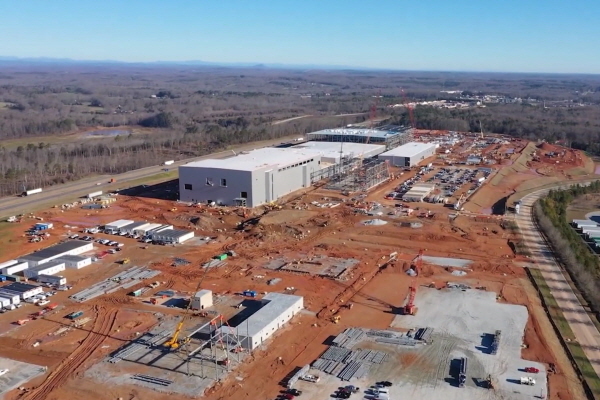[미디어펜=나광호 기자]While the position of Korean-made products in the global electric vehicle battery market is increasing, domestic battery makers such as SK Innovation, Samsung SDI, and LG Energy Solutions have started to’solidify the number 1′.
According to the industry on the 3rd, battery usage for electric vehicles (EV, PHEV, HEV) registered in countries around the world last year was 142.8 GWh, up 21.0% from the previous year. Although the demand for electric vehicles in the first and second quarters declined in the aftermath of Corona 19, it has recovered from the third quarter. Among them, the share of the K-battery was 34.7%, which increased by more than 100% during the same period and ranked first.
 |
||
| ▲ Construction site of SKBA’s first battery factory in Georgia, USA/Photo = SK Innovation | ||
By company, LG Energy Solutions ranked 2nd with 23.5%, following China’s CATL (24.0%), while Samsung SDI (5.8%) and SK Innovation (5.4%) ranked 5th and 6th respectively. As of December, LG Energy Solutions received the gold medal at 26.8%, and Samsung SDI (5.2%) and SK Innovation (4.8%) ranked 5th and 6th respectively.
SNE Research analyzed that CALB showed a three-digit growth rate, and so on, but the Chinese-made position declined due to the decline in market share of other companies such as CATL and BYD. The Japanese market also declined due to the sluggishness of Panasonic and PEVE.
On the other hand, Korean-made △ Tesla Model 3 (made in China) △ Renault Joe △ Volkswagen (VW) ID.3 △ Audi E-tron EV △ Ford Kuga PHEV △ VW Passat GTE △ Hyundai Kona EV (European supply) △ Kia Niro EV, etc. It increased its market share thanks to the increase in sales volume of
In fact, LG Energy Solutions’ sales volume (33.5GWh) increased 2.7 times compared to the previous year, and Samsung SDI (8.2GWh) also surged 85.3%. In particular, SK Innovation (7.7GWh) was found to have increased by 3.4 times.
 |
||
| ▲ Samsung SDI’s electric vehicle battery/photo = Samsung SDI | ||
Additional investments are also being made, such as SK Innovation’s decision to build a third European plant in Hungary. The plant is expected to be built in Ibanchaju, Hungary, with an annual capacity of 30GWh. The total investment cost is $2.290 billion (approximately 2.6 trillion won), and the board of directors of SK Innovation recently decided to invest $1,184 million (approximately 1.27 trillion won) in a Hungarian subsidiary (SKBH).
This is to achieve 125GWh+@ per year in 2025, and secured a site of 700,000m2, which is 98 soccer fields. In terms of investment size, SK Innovation is the largest among battery factories in Europe.
Samsung SDI is also concentrating on the development of next-generation battery material technology and the construction of smart factories, with most of its R&D expenditures, and in particular, is focusing on the development of the fifth-generation electric vehicle battery (Gen. 5), which is expected to be mass-produced in the second half of this year. Gen.5 is a high-nickel anode technology with a nickel content of 88% or more, and is characterized by increased mileage and reduced cobalt ratio.
Samsung SDI has spent 6197 billion won in R&D expenses until the third quarter of last year, and is expected to exceed 800 billion won in the fourth quarter. This is more than 6% of sales, the highest on an annual basis.
LG Energy Solutions also participated in a paid-in capital increase investing 57.5 billion won in Solus Advanced Materials’ European subsidiary to establish a stable raw material supply system, and decided to receive battery foil for five years from January this year to the end of 2025.
An industry insider said, “Even with the Corona 19 pandemic, domestic companies are continuing their growth. To accelerate their global market penetration, it is necessary to increase technological competitiveness and improve growth strategies.”
[미디어펜=나광호 기자] ▶View other articles
